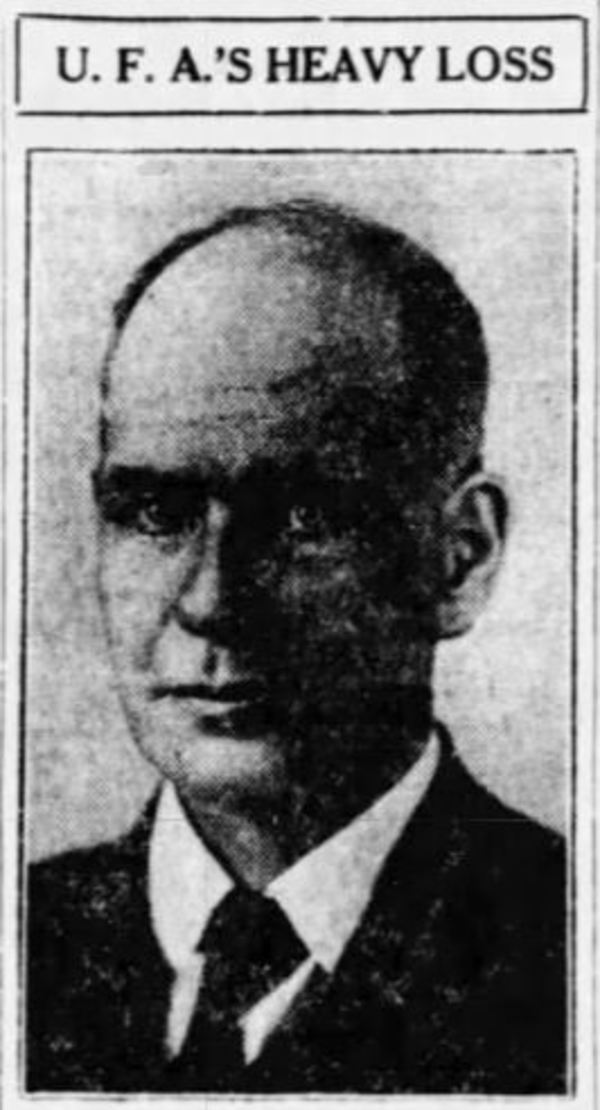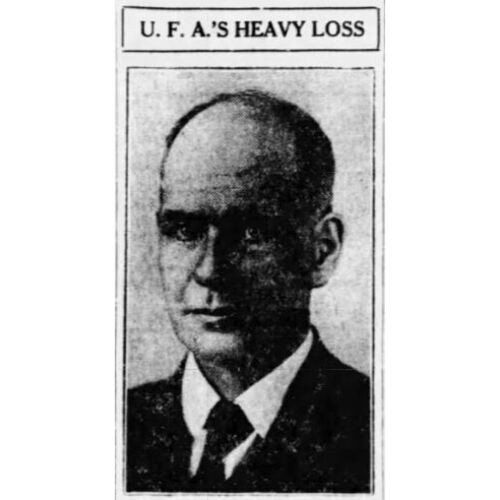
Source: Link
BAKER, PERCIVAL, preacher, farmer, and agrarian leader; b. 11 Jan. 1867 in York County, Upper Canada, son of Jacob Baker and Mary —; m. 11 Sept. 1889 Susan Amanda Page in Vaughan Township, Ont., and they had two daughters and five sons; d. 19 July 1921 in Edmonton.
Percival Baker’s father, a Canadian-born carpenter of German origin, was a Dunker in religion; his mother, of English origin, was a Methodist. Raised in Markham Township, Ont., for a time by the Klinck family, in 1889 Baker graduated from the College of the Bible (now Lexington Theological Seminary) in Lexington, Ky, after studying liberal arts and theology. He served as a Disciples of Christ minister, first in Rodney, Ont., next in Everton, Ont., and then for over ten years in the corn belt of east-central Illinois.
Smitten by the call of the Canadian west, Baker went to Alberta in 1908 and settled near Ponoka. Having had previous experience as a farmhand in Ontario, he built a successful and up-to-date mixed-farming operation. A former officer of the Ontario Disciples of Christ missionary body, he was a leading light in the Alberta Missionary Society of the Disciples of Christ, and he regularly preached in the Disciples church in Ponoka. Thus was he aptly called a “farmer-preacher.”
Baker was a charter member of the Arbor Park local of the United Farmers of Alberta, the province’s main agrarian organization, formed in 1909 [see Edwin Carswell*]. Destiny gripped him in 1916 when he was elected UFA director for the Strathcona constituency. In 1917 he was re-elected to this position, and in July of that year he was appointed third vice-president of the UFA. His leadership talents and “outstanding” contributions in its conventions led to his election from 1918 to 1921 as first vice-president, under President Henry Wise Wood*. In this capacity, he laboured tirelessly to protect the interests of livestock producers. Outside the UFA, he worked to improve public education, and he would become a director of the Western Canada Colonization Association, founded in 1920.
A Liberal in politics before 1919, Baker was on the resolutions committee at the 1917 Western Liberal Convention, which revealed the deep divisions within the party over conscription for overseas military service, soon imposed by Sir Robert Laird Borden*’s government in Ottawa, and over the need for a non-partisan wartime government there. Baker faced a tough challenge in May 1918 after Borden’s Union government had broken its promise to exempt young farmers from compulsory service. Under his guidance, in Wood’s absence, the UFA executive grudgingly accepted the government’s decision on the grounds that the need for more soldiers had become “imperative.” Many Alberta and other farmers were incensed with this apparent endorsement of Ottawa’s widening of the draft, but Baker successfully defended his position at the UFA secretaries’ conventions later in 1918. He also mollified the opposition by issuing, along with two UFA board members, a statement that expressed farmers’ anger over the government’s policy.
Upset with the extension of conscription and other federal government policies, and suspicious of the old political parties, in 1919 Canadian farmers began taking independent and third-party action. At the UFA annual convention in January that year, Baker had presented the resolution that permitted such action. When the UFA executive met in March, he moved two resolutions that paved the way for the merger, later in 1919, of the UFA with the Non-Partisan League, a rival farmers’ political movement. This amalgamation was crucial because it ensured that Alberta farmers entered politics united.
By early 1921 Percival Baker’s star was rising. Ambitious – his gaze betrayed a steely determination – he had proved himself a dedicated and principled leader of sound judgement, a consensus builder, and an excellent orator. It was no surprise that he ran as a UFA candidate in the constituency of Ponoka when the reigning provincial Liberals called an election for 18 July 1921, and it was no surprise that he emerged victorious. But by then, disaster had struck. On 29 June Baker had been hit by a falling tree while clearing land on his farm; he passed away on 19 July, the day after the UFA won a majority government. Had he recovered, Baker would likely have been in the UFA cabinet and perhaps even have been offered the premiership, which in the event went to Herbert Greenfield*. A freak accident prevented him from shaping the political future of Alberta.
This biography is based in part on the author’s interviews with Percy Baker (a grandson of the subject) and Janett [Pearson] Baker of Ponoka, Alta, and Robert Baker (another grandson) of Calgary. Although UFA and family sources indicate that the subject was born in York County, Ont., his marriage registration (AO, RG 80-5-0-174, no.13753) gives his place of birth as Ingersoll, in Oxford County, Ont.
GA, BR UFA, minutes and reports of annual conventions and of executive and board, 1916–21 (mfm.); M 1749, file 13. LAC, RG 31, C1, 1871, Markham Township, Ont., div.2: 50; 1881, Markham Township, div.4: 50. Private arch., Percy and Janett [Pearson] Baker, Birth record, marriage certificate, and other documents; Robert Baker, Documents and letters. Calgary Herald, 19–20 July 1921. Edmonton Journal, 20 July 1921. Grain Growers’ Guide (Winnipeg), 22 May, 12, 26 June 1918; 17 Aug. 1921. Manitoba Free Press, 8 Aug. 1917. Ponoka Herald, 21 July 1921. Reuben Butchart, The Disciples of Christ in Canada since 1830 . . . (Toronto, 1949). Ponoka and District Hist. Soc., Ponoka panorama (Ponoka, 1973).
Cite This Article
Bradford J. Rennie, “BAKER, PERCIVAL,” in Dictionary of Canadian Biography, vol. 15, University of Toronto/Université Laval, 2003–, accessed December 31, 2025, https://www.biographi.ca/en/bio/baker_percival_15E.html.
The citation above shows the format for footnotes and endnotes according to the Chicago manual of style (16th edition). Information to be used in other citation formats:
| Permalink: | https://www.biographi.ca/en/bio/baker_percival_15E.html |
| Author of Article: | Bradford J. Rennie |
| Title of Article: | BAKER, PERCIVAL |
| Publication Name: | Dictionary of Canadian Biography, vol. 15 |
| Publisher: | University of Toronto/Université Laval |
| Year of publication: | 2005 |
| Year of revision: | 2005 |
| Access Date: | December 31, 2025 |



